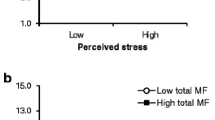Abstract
The present study examined changes in primary and secondary appraisal, and coping strategies utilized in the final weeks leading to dissertation submission. Sixty volunteer Sports Studies dissertation students (male: n = 29; female: n = 31) completed an adapted Cognitive Appraisal of Health Scale (CAHS: Kessler, 1998), and Brief COPE (Carver, Scheier, & Weintraub, 1989) on 4 occasions over the 6 weeks before dissertation submission. Repeated measures multivariate analysis of variance indicated a significant main effect for gender, with no main effect for changes over time and no significant interaction effect. Results demonstrated that males perceived the dissertation to be significantly more threatening and less challenging than females. With regard to coping, males used more active coping, positive reframing, planning, and acceptance of the stressor, with lower scores for self-blame, venting of emotions, and behavioral disengagement. The results suggest that, for this student population, the dissertation did not become increasingly stressful in the period before submission. Clear relationships were also evidenced between primary appraisal, secondary appraisal, and coping. Future research should seek to identify factors that moderate the influence of situational stressors on coping responses among undergraduate students.
Similar content being viewed by others
References
ALDWIN, C. M. (1994). Stress, coping, and development: An integrative perspective. New York: Guildford.
ANSHEL, M. H., & DELANY, J. (2001). Sources of acute stress, cognitive appraisals, and coping strategies of male and female child athletes. Journal of Sport Behavior, 24, 329–353.
ANSHEL, M. H., KIM, K. W., KIM, B. H., CHANG, K. J., & EOM, H. J. (2001). A model for coping with stressful events in sport: Theory, application, and future directions. International Journal of Sport Psychology, 32, 43–75.
BURNS, K. R., & EGAN, E. C. (1994). Description of a stressful encounter: Appraisal, threat and challenge. Journal of Nursing Education, 33, 21–28.
CARVER, C. S., SCHEIER, M. F., & WEINTRAUB, J. K. (1989). Assessing coping strategies: A theoretically based approach. Journal of Personality and Social Psychology, 56, 267–283.
COLLINS, K. M. T., & ONWUEGBUZIE, A. J. (2003). Study coping and examinationtaking coping strategies: The role of learning modalities among female graduate students. Personality and Individual Differences, 35, 1021–1032.
FOLKMAN, S., & LAZARUS, R. S. (1980). An analysis of coping in a middle-aged community sample. Journal of Health and Social Behavior, 21, 219–239.
FOLKMAN, S., & LAZARUS, R. S. (1985). If it changes, it must be a process: Study of emotion and coping during three stages of a college examination. Journal of Personality and Social Psychology, 48, 150–170.
FOLKMAN, S., LAZARUS, R. S., DUNKEL-SCHETIER, C., DELONGIS, A., & GREUN, R. J. (1986). Dynamics of a stressful encounter: Cognitive appraisal, coping, and encounter outcomes. Journal of Personality and Social Psychology, 50, 992–1003.
FRYDENBERG, E. (2002). Beyond coping: Meeting goals, visions and challenges. New York: Oxford University Press.
GOULD, D., UDRY, E., BRIDGES, D., & BECK, L. (1997). Coping with season ending injuries. The Sport Psychologist, 11, 379–399.
GREENGLASS, E. R. (1982). A world of difference: Gender roles in perspective. Toronto: Wiley.
GREENGLASS, E. R. (1993). The contribution of social support to coping strategies. Applied Psychology: An International Review, 42, 323–340.
KESSLER, T. A. (1998). The Cognitive Appraisal of Health Scale: Development and psychometric evaluation. Research in Nursing and Health, 21, 73–82.
KIRAN, R., SHANAZ, M., & SUBBAKRISHNA, D. K. (2000). Appraisal of stress and coping behaviour in college students. Journal of the Indian Academy of Applied Psychology, 26, 5–13.
KROHNE, H. W. (1993). Vigilance and cognitive avoidance as concepts in coping research. In H. W. Krohne (Ed.), Attention and avoidance: Strategies in coping with aversiveness (pp. 19–50). Seattle, WA: Hogrefe & Huber.
LANE, A. M., DEVON PORT, T. J., & HORRELL, A. (2004). Self-efficacy and research methods. Journal of Hospitality, Leisure, Sport and Tourism Education, 3, 25–37.
LAZARUS, R. S. (1991). Emotion and adaptation. New York: Oxford University Press.
LAZARUS, R. S. (1993). From psychological stress to the emotions: A history of changing outlooks. Annual Review of Psychology, 1993 (pp. 1–21). Palo Alto, CA: Annual Reviews.
LAZARUS, R. S. (1999). Stress and emotion: A new synthesis. New York: Springer.
LAZARUS, R. S., & FOLKMAN, S. (1984). Stress, appraisal, and coping. New York: Springer.
MATHENY, K. B., AYCOCK, D. W., & MCCARTHY, C. J. (1993). Stress in schoolaged children and youth. Educational Psychology Review, 5, 109–134.
MATIHEWS, G., & ZEIDNER, M. (2000). Emotional Intelligence, adaptation to stressful encounters, and health outcomes. In R. Bar-On & J. D. A. Parker (Eds.), The handbook of emotional intelligence: Theory, development, assessment, and application at home, school, and in the workplace. San FrancisCO: Jossey-Bass
PIKO, B. (2001). Gender differences and similarities in adolescents’ ways of coping. The Psychological Record, 51, 223–235.
Author information
Authors and Affiliations
Corresponding author
Rights and permissions
About this article
Cite this article
Devonport, T.J., Lane, A.M. Cognitive Appraisal of Dissertation Stress Among Undergraduate Students. Psychol Rec 56, 259–266 (2006). https://doi.org/10.1007/BF03395549
Published:
Issue Date:
DOI: https://doi.org/10.1007/BF03395549




